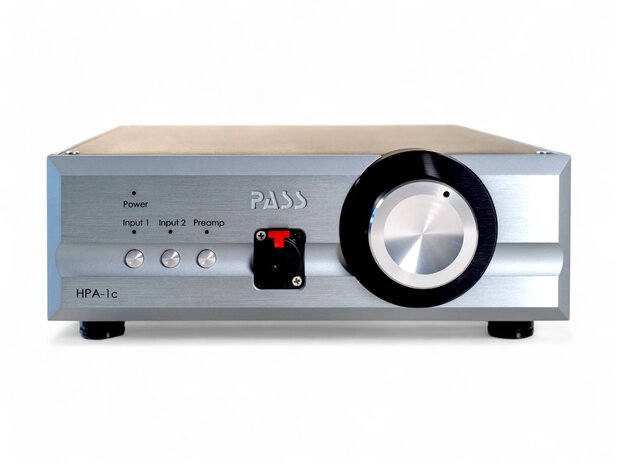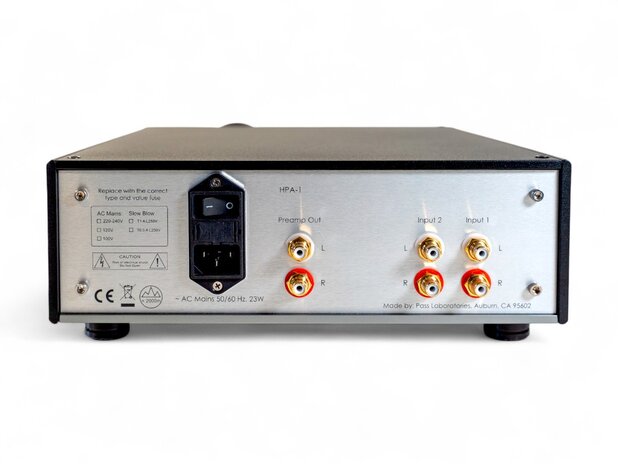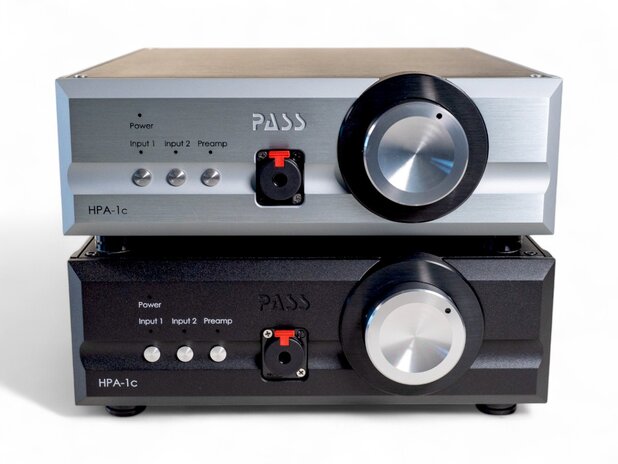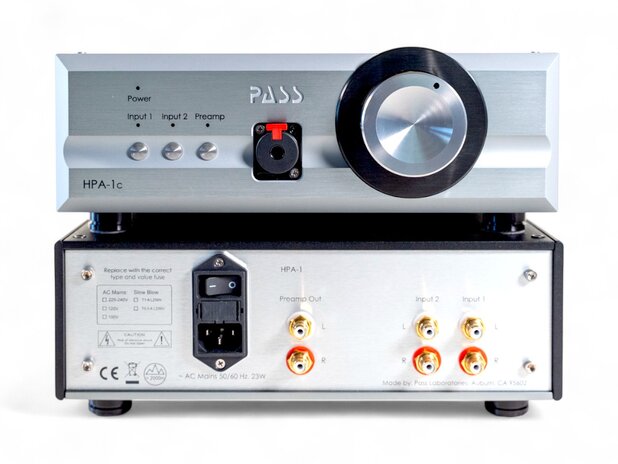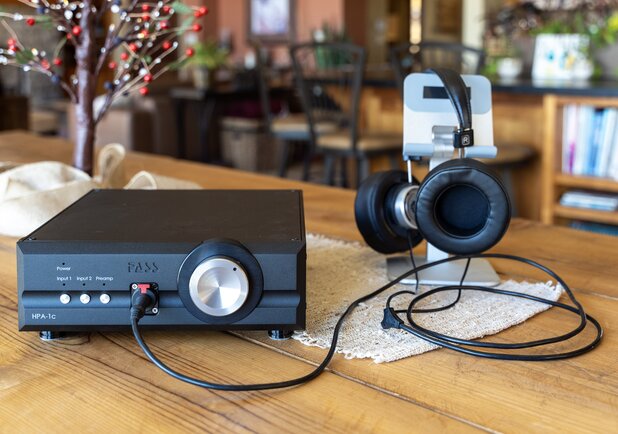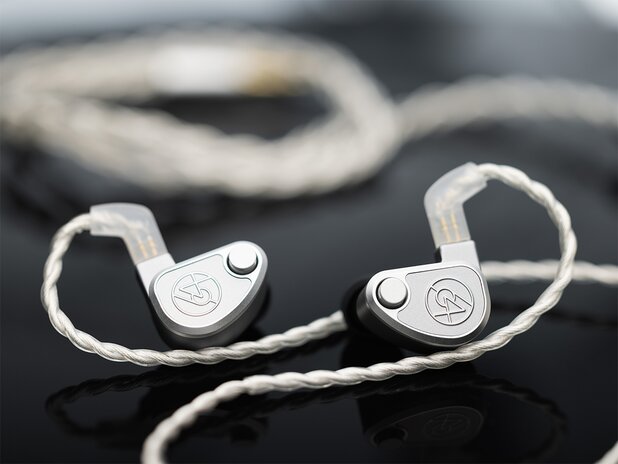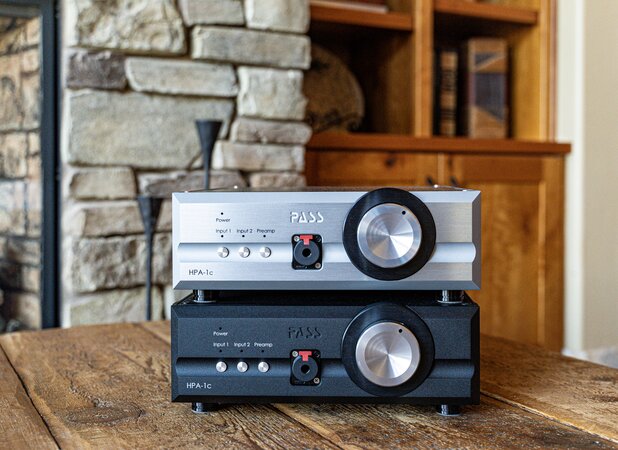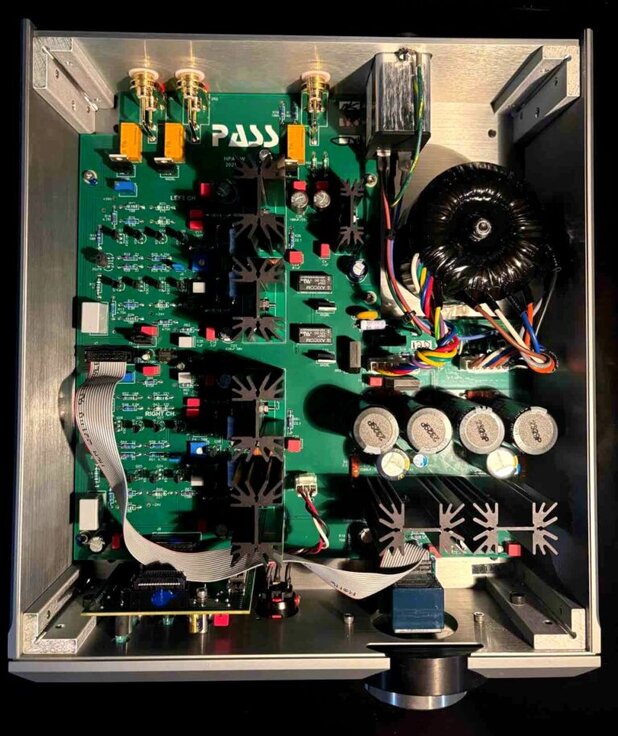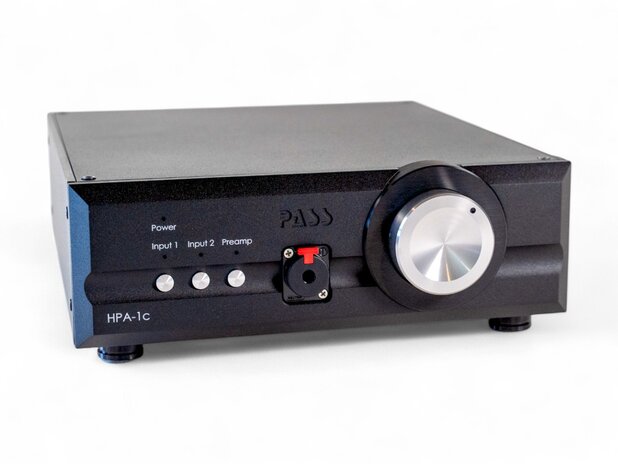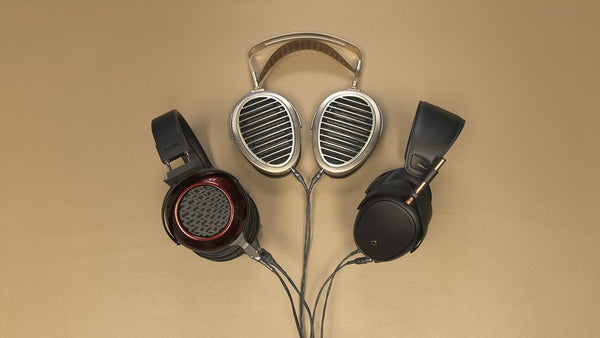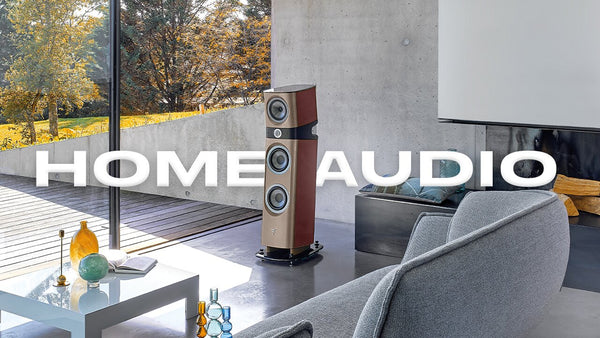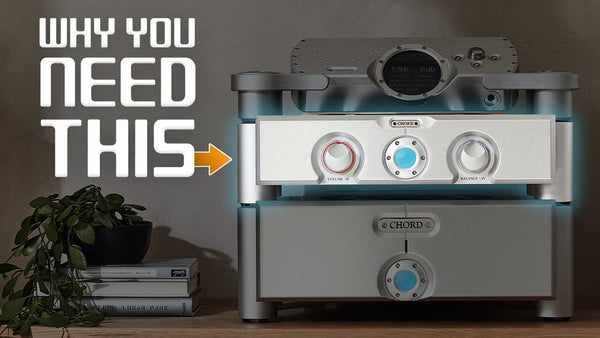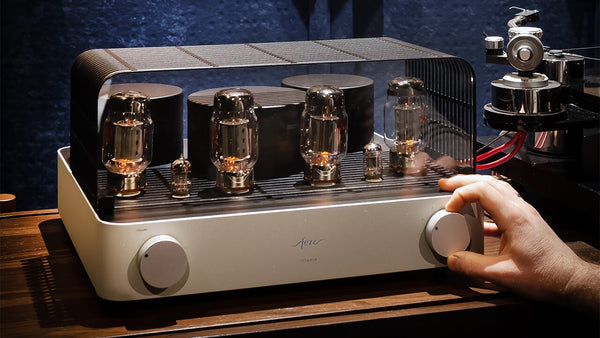Pass Labs HPA-1c Headphone Amp Review: The Worthy Successor to a Hi-Fi Icon
Read Time: Approx. 14 min.

TL;DR
- Refined Evolution: Improves on the HPA-1 with an upgraded power supply and 10dB noise reduction, finally making it suitable for sensitive IEMs without sacrificing its legendary headphone performance
- Dual-Purpose Design: Functions as both a high-end headphone amplifier and a line-level preamp for full stereo systems
- Same rock-solid 14lb aluminum chassis as the original, available in black or silver, with locking Neutrik headphone jack and minimalist three-button interface
- Maintains the HPA-1's authentic, natural Class A sound–smooth, balanced, and dynamic without artificial coloration
- At $4,045, it's positioned as a high-end solution that prioritizes performance and sound quality over trying to be flashy or feature-packed
HPA-1c: The Sequel That Surpasses the Original
When life gives you lemons, you're supposed to make lemonade. But when a global parts shortage forced Pass Laboratories to rethink their legendary Pass Labs HPA-1 Headphone Amplifier, they didn't settle for lemonade–they built something stronger, cleaner, and more refined. At $4,045, the HPA-1c Headphone Amplifier expands on the success of its first-generation model, the HPA-1, with several welcome upgrades.
The HPA-1 was much more than a headphone amplifier; it was a Class-A preamp with a minimalist, no-nonsense approach to hi-fi audio reproduction. Since its debut in 2016, the HPA-1 has become a reputable hi-fi amplifier delivering a rich, powerful sound quality and the ability to drive headphones ranging from sensitive to power-hungry planars like the HiFiMan Susvara.
The HPA-1c raises the bar in headphone amplification with an upgraded power supply and improved circuit board grounding. Local regulation has been added to the servo circuitry, achieving a 10dB improvement in overall noise performance. The result? Greater low-level detail and improved clarity, especially with high-sensitivity IEMs and headphones from brands like Meze and HiFiMan.

PROS
- Maintains the HPA-1's authentic, natural Class A sound
- Serves double duty as a headphone amp and high-quality preamp for loudspeakers
- 10dB improvement eliminates hiss with sensitive IEMs
CONS
- 14 lb weight and substantial footprint may not suit setups limited in space
- No balanced connections, remote control
Design
Coming in at 14lbs and roughly 4.5 x 14 inches, it's small enough to fit on a shelf or inside a cabinet. And for you aesthetically conscious audiophiles, you can now choose between black or silver finishes. The front panel buttons control the inputs and preamp mode. When the preamp function is engaged, the headphone output is disconnected. Press the respective button for input 1 or 2 and the preamp button to use it as a line-level preamp. The back panel still offers two RCA inputs and switchable preamp outputs. Additionally, the rear panel holds the power switch and fuse.
One unique feature worth mentioning: Pass Labs suggests leaving the HPA-1c powered on continuously, as it's designed to run optimally this way. However, the final call is yours–keep it on for daily listening sessions or turn it off while traveling for extended periods. When the power is turned on, the unit goes into a mute state for 20 seconds, allowing the circuitry time to stabilize. During this period, the power LED will flash, and once stabilized, it will stop flashing and stay on.
Quick note about the headphone jack. It's a Neutrik locking headphone connector that was specifically chosen for its rugged reliability. It provides an isolated signal ground connection for greater signal purity, where the high contact pressure and positive locking mechanism work in conjunction to maintain the best possible signal integrity between the amp circuit and the headphones.
The HPA-1c spares nothing in circuit design. Its amplifier circuits are low-feedback, wide-bandwidth, discrete designs employing J-Fet input stages and Class A-biased direct-coupled MOSFET output stages.
Sound
The first-generation HPA-1 had audiophiles falling head over heels for its detailed, dynamic, and accurate sound quality. Many praised it for its uncanny ability to deliver a tube-like sound quality without possessing a single vacuum tube. It wasn't warm or lush, but authentic and emotive. And when something sounds that good and receives that much praise, it mustn't be changed.
The HPA-1c carries the same sonic identity as the HPA-1. It's smooth, balanced, and dynamic. The circuitry improvements were evident when I paired the amp with harder-to-drive planar magnetic headphones like the Grado HP100 SE and Dan Clark Audio E3. But the ultimate test would be how the HPA-1c performed with highly sensitive In-Ear Monitors.
With a sensitivity of 108 dB, the 64 Audio U12t IEMs seemed up to the task. The U12t IEMs deliver an incredible immersive listening experience with great dynamic range and a musical midrange. From the moment I plugged in the U12t to the HPA-1c via a Silver Dragon IEM Cable, I didn't notice any audible hiss from the amplifier. If there was ever any to begin with, it certainly isn't present in the HPA-1c.
With a sensitivity of 108 dB, the 64 Audio U12t IEMs seemed up to the task. The U12t IEMs deliver an incredible immersive listening experience with great dynamic range and a musical midrange. From the moment I plugged in the U12t to the HPA-1c via a Silver Dragon IEM Cable, I didn't notice any audible hiss from the amplifier. If there was ever any to begin with, it certainly isn't present in the HPA-1c.
I'll be honest, I never thought to use the HPA-1 or HPA-1c with IEMs. Any time I listened to it was either in a two-channel system as a preamp or with headphones, so I was pleasantly surprised at how well it complemented IEMs. It's honestly a hidden gem for IEM listeners.
Luck Be a Lady has been my favorite Frank Sinatra song since the first time I heard it. No matter how many Sinatra songs I listen to, I always come back to this song. I can close my eyes and visualize a bustling ballroom with couples swinging and jiving on the dance floor while Sinatra and a band roar from the stage. What a time it must've been to be alive and experience a treat like Sinatra in person. Sinatra's songs are a good judge of sibilance and any shortcomings in a component. And as expected, I experienced a blissful listening experience free of sibilance, fatigue, or unpleasantness.
Listening with the Grado HP100 SE Headphones, I enjoyed the dynamic range and midrange magic of Taylor Swift's song The Man. It's a classic pop hit. Fast, musical, and catchy. Going down the swiftie rabbit hole, I quickly switched gears to a slower song The Archer. This ballade is emotional, rich, and full of melancholy. It's one of those songs that pierces through your head and works its way into your soul. The HPA-1c reproduced Swift's vocals with great realism and authenticity. The emotion behind each word was tangible, lifelike, and relatable.
As a music lover who values the experience above all else, I judge a component by its ability to recreate the magic that was present in the studio, from the moment the lyrics hit the paper to the editing and finalized product. This is where I differ from discerning audiophiles. While I still listen critically and value technical precision, I want to connect with my music, and a great hi-fi component will be able to do both–reproduce a song with accuracy and clarity while conveying the artist's emotions and message. The HPA-1c's natural, authentic sound quality does just that–and some.
The sound quality isn't artificially colored or enhanced. It's clean, dynamic, and accurate. The HPA-1c's low-feedback design preserves the musicality in a song without making it overly warm, lush, or rich. The Aurender A200 and HPA-1c were a powerful duo that performed flawlessly.

Better Man
By Justin Bieber
(SWAG II)

The Man
By Taylor Swift
(Lover)

Luck Be a Lady (2008 Remastered)
By Frank Sinatra
(Nothing But the Best)

Freddie's Mood
By Vince Guaraldi
(Be My Valentine, Charlie Brown)
Features
While the core amplifier circuit of the HPA-1c remains true to its original, the HPA-1, Pass Labs took it upon themselves to refine and enhance its performance. Why, you might ask? Innovation baby.
The HPA-1c features an upgraded power supply and improved circuit board grounding. They completely redesigned the power supply, increasing current draw from 8W to 23W, leaving plenty of headroom for demanding headphones. With great power comes great responsibility, young padawan. These improvements enable the HPA-1c to deliver a cleaner, more stable power foundation, resulting in lower noise, tighter regulation, and a blacker background.
Additionally, Pass Labs has added local regulation to the servo circuitry in the HPA-1c, achieving a 10dB improvement in overall noise performance. This is awesome for IEM listeners, who reported experiencing audible noise and hiss with the first-generation HPA-1. In fact, we actually had a customer tell us they were experiencing hiss with the HPA-1 when they listened with their favorite pair of IEMs. Aside from that minor inconvenience, they had no problems with the HPA-1 and continued to use it with headphones and IEMs.
We shared the customer feedback with Nelson Pass and his team, and while we can't confirm this is what sparked that 10dB improvement, we'd like to think it had a little something to do with it. It just goes to show you how much Pass Labs cares about its customers and their experience using the company's components.
Pass Labs took a unique design approach when building the HPA-1 and HPA-1c. While it is indeed a headphone amplifier, it was designed with the same process as a power amplifier. This approach is what enables the HPA-1c to drive low and high-impedance planar magnetic headphones with ease.
The superpower of the Pass Labs HPA-1c is two-fold. Not only can it drive even the most power-hungry headphones with impedances of 15 ohms to 600 ohms with ease, but it can also act as a line-level preamplifier in a full-size stereo system. The HPA-1c's headphone output delivers up to 2 watts into 32 ohms with a low output impedance of 2 ohms.
The preamp section is capable of driving a typical power amplifier load (10kΩ or higher) with very low output impedance. With its discrete, Class A design and robust output stage, the HPA-1c can serve as the heart of your reference speaker system.
Dragon Cables
[Blue Dragon Interconnect Cable]
I used our Blue Dragon Interconnect Cables to connect the HPA-1c to the Aurender A200 for my listening sessions. The Blue Dragon is designed as a neutral solution, meant to disappear between the components in your system. With zero interference and no added coloration, the Blue Dragon Interconnect was the invisible link between the A200 and HPA-1c.
Our HiFi Audio Dragon Cables bring out more of what you love in your music and audio gear. If you love your headphones but wish they had a bit more top-end sparkle - a Silver Dragon Headphone Cable would be a great option. If your USB cables keep dying - as many stock cables do - then check out our quality USB Audio Cables. We say time and time again that materials matter, and our audio cables and custom geometries actually help to bring out those desired properties in your gear and music. We make tons of custom options for our customers so that you can get the right HiFi Audio cable for your exact needs. If you have any questions feel free to Contact Us and we'll be more than happy to help.
Verdict
At $4,045, the Pass Labs HPA-1c Headphone Amplifier is not a radical redesign. It's refinement done right. The HPA-1c preserves everything fans loved about the original HPA-1 while solving one of its only real weaknesses with sensitive IEMs.
The HPA-1c can serve as a line-level preamplifier in your home audio system or as your dedicated headphone and IEM amplifier. That's the true power of the HPA-1c. It's not flashy or gimmicky. It doesn't try to do too much. Instead, it does one thing extremely well–it brings you closer to your music with honesty, dynamics, and heart.
Whether you're connecting a turntable, digital source, or any other hi-fi component, pair it with our Blue Dragon Interconnect Cable for zero interference and signal integrity between components, with no added coloration. Audiophiles looking for the sheer power, performance, and reliability from an amplifier should look no further than the Pass Labs HPA-1c.
Featured Products
Related Videos
Why Your Audiophile Headphones Need an Amplifier Upgrade
Amps vs. Preamps: What's the Difference?
DACs vs. Amps: What's the Difference & Why You Need Both
What's in the Box
Specifications
Gain (dB): 8 dB
Frequency Response 10Hz-100kHz: -1 dB
Output Power into 20 Ohms: 3500 mW
THD + Noise: < 0.005 at 1V out
Out Power into 300 Ohms: 200 mW
Input Impedance: 50K Ohm
Output Impedance: < 2 ohms
Power Consumption (Watts): 23
Unit Dimension (W x D x H) (In.): 11 x 13.5 x 4
Unit Weight (LBS): 14




